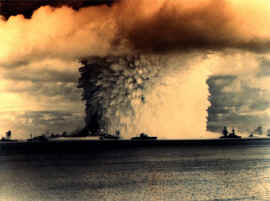The indefensible Hiroshima revisionism that haunts America to this day
Seventy years ago this week we vaporized 250,000 civilians, and yet still view the bombings as an act of mercy
By Christian Appy
Given the last seven decades of perpetual militarization and nuclear “modernization” in this country, the answer may seem like an obvious no. Still, as a historian, I’ve been trying to dig a little deeper into our lack of national contrition. As I have, an odd fragment of Americana kept coming to mind, a line from the popular 1970 tearjerker Love Story: “Love,” says the female lead when her boyfriend begins to apologize, “means never having to say you’re sorry.” It has to be one of the dumbest definitions ever to lodge in American memory, since real love often requires the strength to apologize and make amends.
It does, however, apply remarkably well to the way many Americans think about that broader form of love we call patriotism. With rare exceptions, like the 1988 congressional act that apologized to and compensated the Japanese-American victims of World War II internment, when it comes to the brute exercise of power, true patriotism has above all meant never having to say you’re sorry. The very politicians who criticize other countries for not owning up to their wrong-doing regularly insist that we should never apologize for anything. In 1988, for example, after the U.S. Navy shot down an Iranian civilian airliner over the Persian Gulf killing all 290 passengers (including 66 children), Vice President George H.W. Bush, then running for president, proclaimed, “I will never apologize for the United States. Ever. I don’t care what the facts are.”
By 1945, most Americans didn’t care that the civilians of Hiroshima and Nagasaki had not committed Japan’s war crimes. American wartime culture had for years drawn on a long history of “yellow peril” racism to paint the Japanese not just as inhuman, but as subhuman. As Truman put it in his diary, it was a country full of “savages”—“ruthless, merciless, and fanatic” people so loyal to the emperor that every man, woman, and child would fight to the bitter end. In these years, magazines routinely depicted Japanese as monkeys, apes, insects, and vermin. Given such a foe, so went the prevailing view, there were no true “civilians” and nothing short of near extermination, or at least a powerful demonstration of America’s willingness to proceed down that path, could ever force their surrender. As Admiral William “Bull” Halsey said in a 1944 press conference, “The only good Jap is a Jap who’s been dead six months.”
In the years after World War II, the most virulent expressions of race hatred diminished, but not the widespread idea that the atomic bombs had been required to end the war, eliminating the need to invade the Japanese home islands where, it was confidently claimed, tooth-and-nail combat would cause enormous losses on both sides. The deadliest weapon in history, the one that opened the path to future Armageddon, had therefore saved lives. That was the stripped down mantra that provided the broadest and most enduring support for the introduction of nuclear warfare. By the time Truman, in retirement, published his memoir in 1955, he was ready to claim with some specificity that an invasion of Japan would have killed half-a-million Americans and at least as many Japanese.
Neither the Indians nor the Japanese were good white Christian people like us. Therefore, it didn't matter to us if they lived or died.
That's been the core of the Euro-American mindset since 1492, if not earlier. We see it today as the police beat and kill brown people while Republicans slash their health and welfare services and Obama bombs and assassinates them. Many Americans simply don't care whether brown people live or die.
For more on the subject, see Whites Destroy Other People's Homes and Mass Murder in Gaza and Hiroshima.


No comments:
Post a Comment
Note: Only a member of this blog may post a comment.